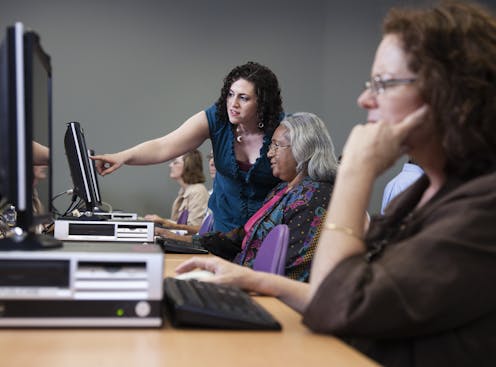The downside of digital transformation: why organisations must allow for those who can’t or won’t move online
- Written by The Conversation

We hear the phrase “digital transformation” a lot these days. It’s often used to describe the process of replacing functions and services that were once done face-to-face by human beings with online interactions that are faster, more convenient and “empower” the user.
But does digital transformation really deliver on those promises? Or does the seemingly relentless digitalisation of life actually reinforce existing social divides and inequities?
Take banking, for example. Where customers once made transactions with tellers at local branches, now they’re encouraged to do it all online. As branches close it leaves many, especially older people, struggling with what was once an easy, everyday task.
Or consider the now common call centre experience involving an electronic voice, menu options, chatbots and a “user journey” aimed at pushing customers online.
As organisations and government agencies in Aotearoa New Zealand and elsewhere grapple with the call to become more “digital”, we have been examining the consequences for those who find the process difficult or marginalising.
Since 2021 we’ve been working with the Citizens Advice Bureau (CAB) and talking with public and private sector organisations that use digital channels to deliver services. Our findings suggest there is much still to be done to find the right balance between the digital and non-digital.
The ‘problematic’ non-user
The dominant view now suggests the pursuit of a digitally enabled society will allow everyone to lead a “frictionless” life. As the government’s own policy document, Towards a Digital Strategy for Aotearoa, states:
Digital tools and services can enable us to learn new skills, transact with ease, and to receive health and well-being support at a time that suits us and without the need to travel from our homes.
Of course, we’re already experiencing this new world. Many public and private services increasingly are available digitally by default. Non-digital alternatives are becoming restricted or even disappearing.
Read more: The digital divide leaves millions at a disadvantage during the coronavirus pandemic
There are two underlying assumptions to the view that everyone can or should interact digitally.
First, it implies that those who can’t access digital services (or prefer non-digital options) are problematic or deficient in some way – and that this can be overcome simply through greater provision of technology, training or “nudging” non-users to get on board.
Second, it assumes digital inclusion – through increasing the provision of digital services – will automatically increase social inclusion.
Neither assumption is necessarily true.
‘Digital enforcement’
The CAB (which has mainly face-to-face branches throughout New Zealand) has documented a significant increase in the number of people who struggle to access government services because the digital channel was the default or only option.
The bureau argues that access to public services is a human right and, by implication, the move to digital public services that aren’t universally accessible deprives some people of that right.
In earlier research, we refer to this form of deprivation as “digital enforcement” – defined as a process of dispossession that reduces choices for individuals.
Read more: Digital inequality: why can I enter your building – but your website shows me the door?
Through our current research we find the reality of a digitally enabled society is, in fact, far from perfect and frictionless. Our preliminary findings point to the need to better understand the outcomes of digital transformation at a more nuanced, individual level.
Reasons vary as to why a significant number of people find accessing and navigating online services difficult. And it’s often an intersection of multiple causes related to finance, education, culture, language, trust or well-being.
Even when given access to digital technology and skills, the complexity of many online requirements and the chaotic life situations some people experience limit their ability to engage with digital services in a productive and meaningful way.
The human factor
The resulting sense of disenfranchisement and loss of control is regrettable, but it isn’t inevitable. Some organisations are now looking for alternatives to a single-minded focus on transferring services online.
They’re not completely removing call centre or client support staff, but instead using digital technology to improve human-centred service delivery.
Read more: 'Sorry, I don’t understand that' – the trouble with chatbots and how to use them better
Other organisations are considering partnerships with intermediaries who can work with individuals who find engaging with digital services difficult. The Ministry of Health, for example, is supporting a community-based Māori health and social services provider to establish a digital health hub to improve local access to health care.
Our research is continuing, but we can already see evidence – from the CAB itself and other large organisations – of the benefits of moving away from an uncritical focus on digital transformation.
By doing so, the goal is to move beyond a divide between those who are digitally included and excluded, and instead to encourage social inclusion in the digital age. That way, organisations can still move forward technologically – but not at the expense of the humans they serve.







